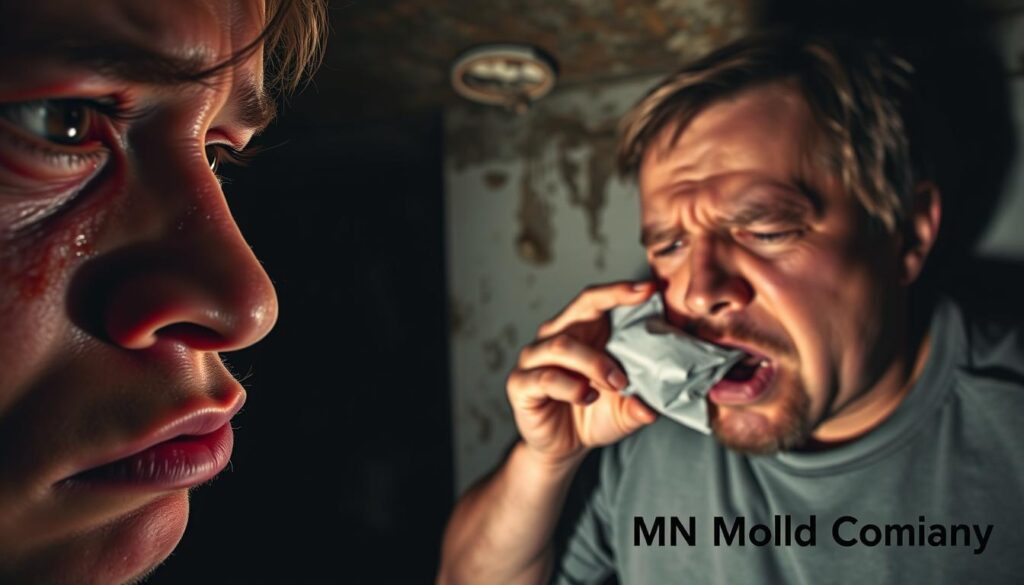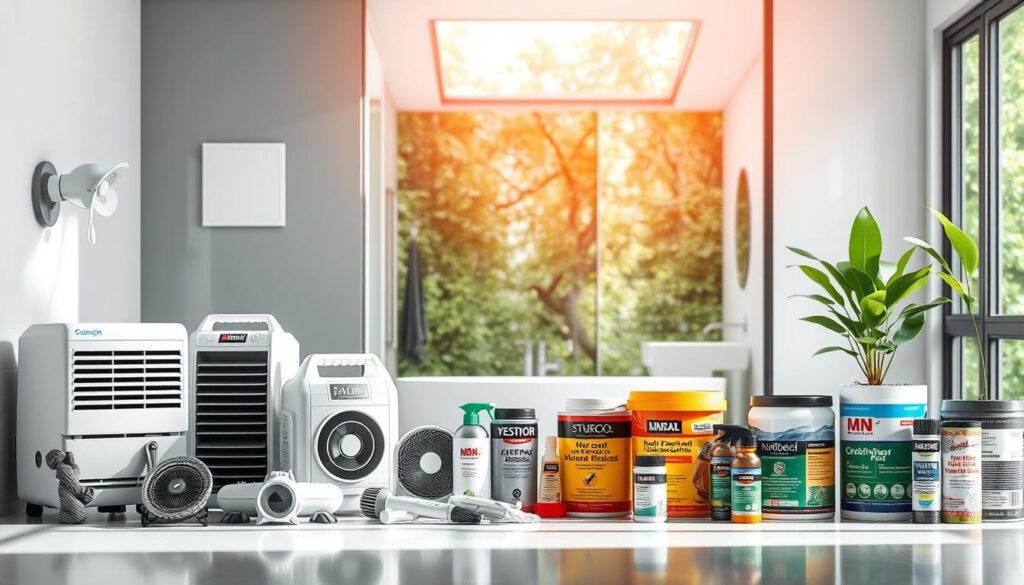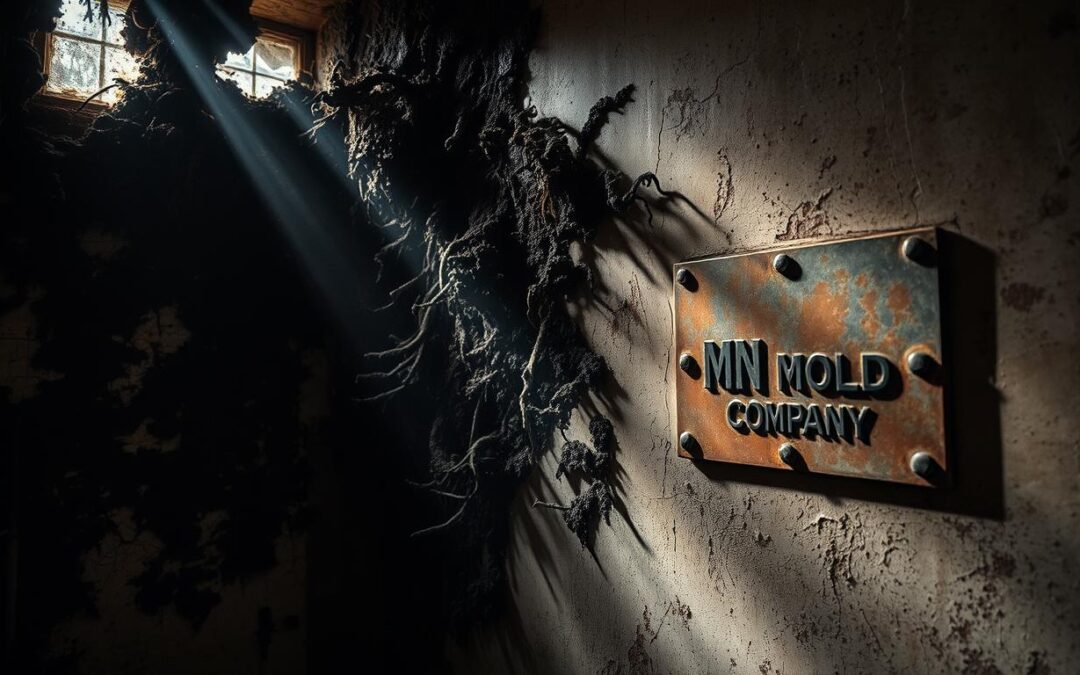Have you ever wondered how dangerous black mold really is? This common household fungus can grow in damp areas like basements and bathrooms, thriving where moisture and oxygen are present. While it’s not deadly for most people, black mold, specifically Stachybotrys chartarum, can cause significant health issues, especially for those with allergies or weakened immune systems.
Research shows that black mold produces spores and compounds that can lead to allergic reactions and respiratory irritation. For sensitive individuals, symptoms can appear quickly, while others might not notice any effects. Understanding the risks and taking preventive measures is crucial for maintaining a healthy home environment.
At [Your Company Name], we offer free mold inspections and employ certified technicians to ensure your home is safe. Booking an inspection is easy—simply visit our website or call us at 612-477-0804. Don’t wait to address potential mold issues; your health and comfort depend on it.
Key Takeaways
- Black mold thrives in moist environments and can cause health issues if not removed.
- People with allergies or weakened immune systems are at higher risk of severe reactions.
- Preventive measures, like controlling humidity, are essential to avoid mold growth.
- Professional inspections and certified technicians can ensure your home is mold-free.
- Addressing mold issues promptly protects your health and home integrity.
Understanding Black Mold and Its Effects on Health
Have you ever wondered what makes black mold so concerning? While many types of mold exist, black mold, often referred to as Stachybotrys chartarum, stands out due to its potential to release harmful spores, especially for sensitive individuals.
What Is Black Mold?
Black mold is a type of fungus that thrives in damp environments. It is commonly found in areas with high humidity, such as bathrooms, basements, and near water leaks. Unlike other molds, black mold has a distinctive dark appearance and is known for producing mycotoxins, which can be harmful to human health.
Environmental Conditions and Growth Factors
Black mold grows best in environments with moisture levels exceeding 70% humidity. It feeds on materials like wood, paper, and cotton. Indoor locations such as basements and bathrooms are prime spots for its growth. Research indicates that controlling humidity below 50% is key to preventing mold growth.
According to studies, exposure to black mold can lead to allergic reactions and respiratory issues. People with allergies or weakened immune systems are more susceptible to severe symptoms. Understanding these factors is crucial for maintaining a healthy indoor environment.
Is Black Mold Dangerous?
Black mold is often feared, but how dangerous is it really? While it can pose health risks, the actual danger depends on several factors.
Debunking Common Myths
One common myth is that black mold is deadly. However, research from the CDC and NIEHS shows that typical exposure leads to mild symptoms for most people. The fear of mycotoxins is often exaggerated.
Scientific Research and Findings
Studies indicate that black mold exposure rarely causes severe health issues in healthy individuals. However, those with weakened immune systems or allergies are at higher risk of respiratory reactions. For example, people with asthma may experience more severe symptoms.
| Symptom | Severity | Affected Group | Action |
|---|---|---|---|
| Coughing, Sneezing | Mild | Healthy Individuals | Over-the-counter medications |
| Breathing Difficulties | Moderate | People with Allergies | Medical consultation |
| Severe Respiratory Issues | Severe | Those with Weakened Immune Systems | Professional remediation |
While black mold can cause discomfort, it’s rarely life-threatening. However, addressing it promptly is crucial for long-term health, especially for vulnerable groups.
Recognizing Mold Exposure and Symptoms
Exposure to mold can lead to a variety of health issues, ranging from mild discomfort to severe reactions. Understanding these symptoms is crucial for taking appropriate action.
Allergy and Respiratory Reactions
Mold exposure often triggers allergic reactions. Common symptoms include sneezing, coughing, and watery eyes. For individuals with allergies or asthma, these reactions can escalate into respiratory difficulties, such as wheezing or shortness of breath.

In severe cases, prolonged exposure can cause skin rashes or irritation. People with weakened immune systems are at a higher risk of experiencing these more serious reactions.
When to Seek Medical Advice
If symptoms persist or worsen, it’s important to consult a healthcare professional. Severe respiratory issues or persistent coughing are signs that medical attention is necessary. Early intervention can prevent long-term health complications.
Research shows that prompt action can significantly reduce the impact of mold exposure. Stay vigilant and take care of your health to avoid prolonged discomfort.
Preventing Mold Growth in Your Home
Keeping your home free from mold growth requires a proactive approach. Mold thrives in damp environments, making moisture control and proper ventilation essential. By taking small, immediate steps, you can significantly reduce the risk of mold colonization and protect your health.
One of the most effective ways to prevent mold growth is by controlling indoor humidity. Use dehumidifiers in damp areas like basements and ensure good airflow throughout your home. Fixing water leaks promptly is also crucial, as standing water creates the perfect environment for mold to grow.

Regular home inspections can help identify potential moisture issues before they escalate. Check for condensation on windows and ensure vents are unobstructed. If you find mold, clean it safely with a solution of water and bleach, avoiding the temptation to paint over it.
- Use exhaust fans during cooking and showering to reduce moisture buildup.
- Ensure windows and vents are clear to promote air circulation.
- Inspect your home regularly for signs of water damage or condensation.
By maintaining a dry, well-ventilated environment, you can create a home where mold struggles to grow. These simple steps not only protect your home but also safeguard your health and comfort.
Professional Mold Services and How We Can Help
Dealing with mold growth in your home can be overwhelming, but you don’t have to face it alone. Our professional mold services are designed to provide you with peace of mind and a safe living environment.
Free Mold Inspections – Call 612-477-0804
Identifying mold issues early is crucial for preventing further damage. We offer free mold inspections to help you understand the extent of the problem. Our certified technicians will assess your home thoroughly, ensuring no signs of mold go unnoticed. Call us today at 612-477-0804 to schedule your inspection and take the first step toward a mold-free home.
Certified Mold Technicians at Your Service
Our team of certified mold technicians is trained to handle all types of mold infestations safely and effectively. With specialized training in mold removal and remediation, we ensure that your home is not only clean but also protected from future growth. Trust us to handle the job with care and professionalism.
Easy Online Booking for Mold Assessments
We understand that your time is valuable. That’s why we offer easy online booking for mold assessments. Simply visit our website, fill out the form, and we’ll be there to help you as soon as possible. Our convenient scheduling system is designed to fit your busy lifestyle.
| Service | Benefits | Action |
|---|---|---|
| Free Mold Inspections | Identify hidden mold issues early | Call 612-477-0804 |
| Certified Technicians | Expert mold removal and safety | Schedule Online |
| Easy Online Booking | Convenient and fast service | Book Now |
Don’t let mold take over your home. Our professional services are here to help you remove mold effectively and prevent future growth. With free inspections, certified technicians, and easy online booking, we make it simple for you to safeguard your health and home. Contact us today to learn more about how we can assist you in creating a mold-free environment.
Managing Mold Risks and Long-Term Health Considerations
Proactively managing mold risks is essential for protecting long-term health and indoor air quality. Repeated exposure to mold spores can lead to chronic respiratory issues and allergic reactions, particularly in individuals with weakened immune systems. Over time, these effects can worsen, causing severe health complications for vulnerable groups.
Research indicates that prolonged mold exposure is linked to increased respiratory problems and heightened allergy sensitivity. For people with pre-existing conditions like asthma, even low levels of mold can trigger severe reactions. Regular home maintenance and mold risk assessments are critical to preventing resurgence and safeguarding health.
To minimize risks, focus on controlling humidity, fixing water leaks, and improving ventilation. Regular inspections and professional remediation are vital for ensuring a mold-free environment. By combining preventative measures with expert solutions, you can protect your family’s health and create a safer living space.
Conclusion
Understanding the risks of mold exposure is key to maintaining a healthy home environment. Black mold, specifically Stachybotrys chartarum, can pose significant health concerns, especially for individuals with allergies or weakened immune systems. Research shows that prolonged exposure can lead to respiratory issues and allergic reactions, making it crucial to address mold growth promptly.
Preventive measures such as controlling humidity levels and fixing water leaks can significantly reduce the risk of mold growth. Regular home inspections and maintaining good ventilation are essential steps in protecting your home and health. If you suspect a mold issue, don’t hesitate to seek professional help to ensure a safe and effective solution.
Stay proactive about indoor air quality and take the necessary steps to safeguard your family’s health. Remember, a well-maintained home is the best defense against mold-related issues.
FAQ
What is black mold, and how does it affect health?
Black mold, scientifically known as *Stachybotrys chartarum*, is a type of fungus that thrives in damp environments. It releases mycotoxins, which can cause respiratory issues, allergic reactions, and other health problems, especially in individuals with a weakened immune system.
Can exposure to black mold cause long-term health issues?
Yes, prolonged exposure to black mold can lead to chronic respiratory conditions, such as asthma, and may exacerbate existing allergies. In severe cases, it can affect the immune system and increase the risk of infections in vulnerable individuals.
How does black mold grow indoors?
Black mold grows in moist environments, often on water-damaged surfaces like walls, ceilings, and windows. Poor ventilation and high humidity create ideal conditions for its growth, making it a common issue in homes after floods or leaks.
What are the common symptoms of mold exposure?
Common symptoms include coughing, sneezing, itchy eyes, and nasal congestion. In more severe cases, exposure can lead to skin irritation, headaches, and fatigue. People with asthma may experience worsened symptoms.
How can I prevent mold growth in my home?
To prevent mold growth, ensure good ventilation, fix water leaks promptly, and reduce humidity using dehumidifiers. Regularly inspect areas prone to moisture, such as bathrooms and basements, and clean surfaces to avoid mold buildup.
When should I seek professional help for mold removal?
If you notice widespread mold growth or if you or a family member is experiencing persistent health symptoms, it’s best to contact a certified mold removal service. Professionals can safely remove mold and ensure your home is free from spores and mycotoxins.
Can black mold cause infections in healthy individuals?
While rare, black mold can cause infections in people with a weakened immune system, such as those with chronic illnesses or undergoing treatment. Healthy individuals are less likely to develop infections but may still experience allergic reactions or respiratory discomfort.
How can I test my home for black mold?
You can purchase mold testing kits or hire a professional to assess your home. Look for visible signs of mold on walls, ceilings, and window sills, and check for a musty odor, which often indicates mold presence.
Are there any natural ways to remove black mold?
While natural solutions like vinegar or bleach can help remove small areas of mold, they may not eliminate the root cause. For large infestations, professional removal is recommended to ensure safety and prevent re-growth.
Can mold exposure worsen asthma symptoms?
Yes, mold spores can trigger asthma attacks and worsen symptoms like wheezing and shortness of breath. Reducing mold exposure is crucial for managing asthma and maintaining respiratory health.
How long does it take to recover from mold exposure?
Recovery time varies depending on the severity of exposure and individual health. Most people experience improvement within a few days of removing the source of mold, but chronic conditions may take longer to resolve.
Can pets be affected by black mold exposure?
Yes, pets can suffer from mold exposure, showing symptoms like coughing, vomiting, or skin irritation. If you suspect your pet has been exposed, consult a veterinarian for proper diagnosis and treatment.
Source Links
- Black Mold Exposure: Symptoms, Risks & Treatment – https://my.clevelandclinic.org/health/diseases/24862-black-mold
- Black mold exposure: Symptoms, treatment, and prevention – https://www.medicalnewstoday.com/articles/323419
- Why Is Black Mold So Dangerous? – https://www.airoasis.com/blogs/articles/why-is-black-mold-so-dangerous?srsltid=AfmBOoo22Y1Y-rr6yaoXkjjLD61GmBGupEv9t8ocuVmo1rSwIFP679cp
- Mold – https://www.cdc.gov/mold-health/about/index.html
- Mold – https://www.niehs.nih.gov/health/topics/agents/mold
- What Is Black Mold? – https://www.healthline.com/health/black-mold-exposure
- Black mould: How dangerous is it in the home and how can it be treated? – https://www.bbc.com/news/uk-63642856
- Can Black Mold Kill You? Fortunately, Probably Not – https://www.healthline.com/health/allergies/can-black-mold-kill-you
- What You Need to Know – https://www.health.ny.gov/publications/7287/
- Recognizing The Symptoms of Black Mold Exposure – https://www.unionrestoration.com/blog/symptoms-of-black-mold
- Dealing with and preventing mold in your home – https://extension.umn.edu/moisture-and-mold-indoors/dealing-and-preventing-mold-your-home
- Can Mold Make You Sick? Signs of Mold Exposure – https://www.healthline.com/health/mold-in-house
- Black Mold Exposure: What You Need to Know About Symptoms and Treatment – https://www.puroclean.com/southlake-tx-puroclean-southlake/blog/black-mold-exposure-what-you-need-to-know-about-symptoms-and-treatment/
- Black Mold Remediation: How to Clean Black Mold – https://www.puroclean.com/blog/black-mold-removal-and-remediation/
- Mold: Problems and Solutions – https://www.fema.gov/fact-sheet/mold-problems-and-solutions
- Mold remediation, mold abatement, mold restoration services for your home or business – https://www.servpro.com/services/mold-remediation
- Mold and Health Guidance – https://www.dhs.wisconsin.gov/mold/hp.htm
- Understanding and addressing the health risks of damp and mould in the home – https://www.gov.uk/government/publications/damp-and-mould-understanding-and-addressing-the-health-risks-for-rented-housing-providers/understanding-and-addressing-the-health-risks-of-damp-and-mould-in-the-home–2
- Mold allergy-Mold allergy – Diagnosis & treatment – Mayo Clinic – https://www.mayoclinic.org/diseases-conditions/mold-allergy/diagnosis-treatment/drc-20351525
- Can Black Mold Kill You? – https://www.webmd.com/lung/can-black-mold-kill-you
- Is Black Mold Dangerous? | The BrickKicker – https://www.brickkicker.com/is-black-mold-dangerous/

